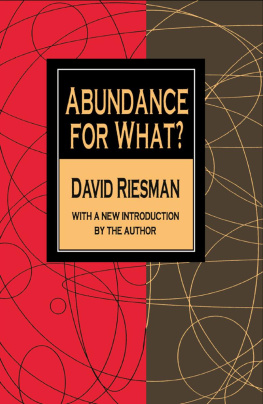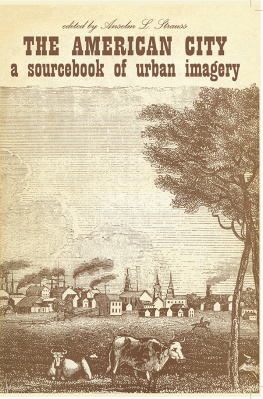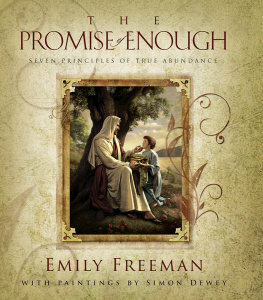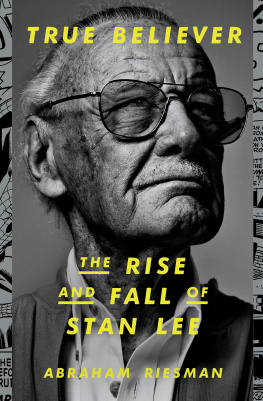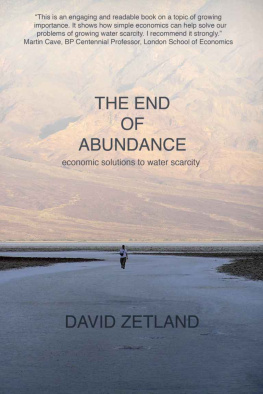Originally published in 1964 by Doubleday & Company, Inc.
Published 1993 by Transaction Publishers
Published 2019 by Routledge
2 Park Square, Milton Park, Abingdon, Oxon OX14 4RN
52 Vanderbilt Avenue, New York, NY 10017
Routledge is an imprint of the Taylor & Francis Group, an informa business
New material this edition copyright 1993 by Taylor & Francis.
All rights reserved. No part of this book may be reprinted or reproduced or utilised in any form or by any electronic, mechanical, or other means, now known or hereafter invented, including photocopying and recording, or in any information storage or retrieval system, without permission in writing from the publishers.
Notice:
Product or corporate names may be trademarks or registered trademarks, and are used only for identification and explanation without intent to infringe.
Library of Congress Catalog Number: 9318093
Library of Congress Cataloging-in-Publication Data
Riesman, David 1909
Abundance for what? / David Riesman.
p.cm.
Originally published: Garden City, N.Y. : Doubleday, 1964. With new introd.
Includes bibliographical references.
ISBN: 1560005998 (paper)
1. Quality of lifeUnited States. 2. United StatesSocial conditions1945 3. WealthUnited States. 4. LeisureUnited States. 5. Social history20th century. I. Title.
HN58.R5 1993
306.0973dc20
ISBN 13: 978-1-56000-599-5 (pbk)
ISBN 13: 978-1-138-51860-5 (hbk)
Acknowledgments
National Purpose Copyright 1963 by the Council for Correspondence Newsletter. Reprinted by permission of the Council for Correspondence Newsletter.
The American Crisis by David Riesman and Michael Maccoby. Reprinted by permission of Doubleday & Company, Inc.
The Nylon War Copyright 1954 by The Free Press of Glencoe. New material copyright 1962 by Quincy Wright, William M. Evan, and Morton Deutsch. Reprinted by permission of The Free Press of Glencoe, and Simon and Schuster, Inc.
Some Observations on the Limits of Totalitarian Power Copyright 1954 by The Free Press of Glencoe. Reprinted by permission of The Free Press of Glencoe.
The Cold War and the West Copyright 1962 by David Riesman. Questions copyright 1962 by The Partisan Review and reprinted by permission of The Partisan Review.
Careers and Consumer Behavior by David Riesman and Howard Rose-borough. Copyright 1955 by the New York University Press. Reprinted by permission of the New York University Press.
A Career Drama in a Middle-aged Farmer Copyright 1954 by David Riesman.
Work and Leisure: Fusion or Polarity? by David Riesman and Warner Bloomberg, Jr. Copyright 1957 by Harper & Row, Publishers, Incorporated. Reprinted by permission of the publishers.
Leisure and Work in Postindustrial Society Reprinted with permission of the publisher from Mass Leisure, edited by Eric Larrabee and Rolf Meyersohn. Copyright 1958 by The Free Press, a Corporation.
Some Issues in the Future of Leisure by David Riesman and Robert S. Weiss. Copyright 1961 by the Society for the Study of Social Problems. Reprinted by permission of Social Problems.
Sociability, Permissiveness, and Equality: A Preliminary Formulation by David Riesman, Robert J. Potter, and Jeanne Watson. Copyright 1960 by the William Alanson White Psychiatric Foundation. Reprinted by permission of Psychiatry, Journal for the Study of Interpersonal Processes.
The Suburban Dislocation Copyright 1957 by David Riesman.
Flight and Search in the New Suburbs Copyright 1959 by David Riesman.
Autos in America by David Riesman and Eric Larrabee. Copyright 1958 by Lincoln H. Clark. Reprinted by permission of Harper & Row, Publishers, Incorporated.
The Found Generation Copyright 1956 by David Riesman.
The Social and Psychological Setting of Veblens Economic Theory Copyright 1954 by The Free Press of Glencoe. Reprinted by permission of The Free Press of Glencoe.
The Relevance of Thorstein Veblen by David Riesman and Staughton Lynd. Copyright 1960 by David Riesman and Staughton Lynd. Printed by permission of Charles Scribners Sons.
Self and Society: Reflections on Some Turks in Transition by David Riesman and Daniel Lerner. Reprinted by permission of Explorations.
The Oral Tradition, The Written Word, and The Screen Image Copyright 1956 by David Riesman. Additional material reprinted by permission of the Beacon Press, copyright i960 by the Beacon Press.
Law and Sociology Early version copyright 1957 by the Board of Trustees of the Leland Stanford Junior University. Reprinted by permission of the editors of the Stanford Law Review. Revised version reprinted here with permission of the publisher from Law and Sociology, edited by William M. Evan. Copyright 1962 by The Free Press of Glencoe.
Tocqueville as Ethnographer Copyright 1961 by David Riesman.
Introduction to Crestwood Heights Copyright 1956 by Basic Books, Inc. Reprinted by permission of Basic Books, Inc. and the University of Toronto Press.
Orbits of Tolerance, Interviewers, and Elites Copyright 1956 by Princeton University. Reprinted by permission of The Public Opinion Quarterly.
Interviewers, Elites and Academic Freedom Copyright 1958 by the Society for the Study of Social Problems. Reprinted by permission of Social Problems.
The Study of National Character: Some Observations on the American Case Copyright 1959 by the President and Fellows of Harvard College. Reprinted by permission of The Harvard Library Bulletin.
Authors Note (1964)
Several of the essays included in this volume are joint products, and I am indebted to my colleagues for their generosity in allowing me to reprint here work on which they contributed as much as I. Michael Maccoby is the coauthor of The American Crisis; Eric Larrabee, of the paper on the auto; Mark Benney, of the article on The Sociology of the Interview; Howard Roseborough, of Careers and Consumer Behavior; Robert S. Weiss, of Some Issues in the Future of Leisure; Robert J. Potter and Jeanne Watson of Sociability, Permissiveness, and Equality,
Over the past seven years a number of foundations supported some of the work represented here. The Behavioral Sciences Division of the Ford Foundation financed the Center for the Study of Leisure of which I was Director at the University of Chicago (1955-58); the Foundations Fund for Research in Psychiatry supported the work on the interview (of which two out of half a dozen papers and monographs are reprinted here); the National Institute of Mental Health supported the Sociability Project, one of whose publications is included; the Carnegie Corporation has assisted work on higher education reflected in the essays, Some Continuities and Discontinuities in the Education of Women and Law and Sociology. I am indebted to these foundations for their flexibility as well as their generosity.
The editorial help of Anne Freedgood and Phyllis Klein is gratefully acknowledged.


